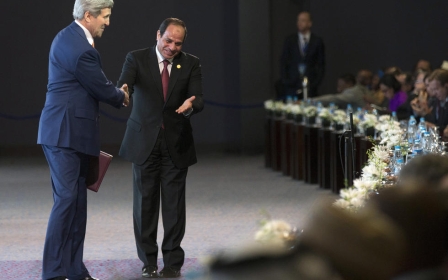Egyptian state media pounce on Kerry's Muslim Brotherhood comments

Egyptian state media misquoted US Secretary of State John Kerry after a joint press conference with Foreign Minister Sameh Shoukry earlier this week, claiming that his comments amounted to US acknowledgement that the Muslim Brotherhood was a "terrorist" organisation, and that Egypt was right to ban the group.
The claims followed Kerry’s visit to Egypt on 2 August, after which some state media outlets enthusiastically jumped on his remarks in response to a question from a New York Times correspondent.
Kerry met with President Abdel Fatah al-Sisi and Shoukry, praising US-Egypt bilateral relations and their commitment to fighting terrorism in the region.
During the press conference, Michael Gordon asked Kerry whether he thought that banning the Muslim Brotherhood's democratically elected Justice and Development Party benefitted stability within the country.
In Kerry’s response, he refused to generalise about the Muslim Brotherhood and replied that “certain people and certain members” had engaged in acts of violence, adding "obviously not everybody, not a whole group..."
State media widely circulated statements from various Egyptian officials who all expressed their opinions that Kerry’s answer was a late recognition of the fact that the Muslim Brotherhood is a terrorist group, which justified the 30 June “second revolution” against the government of President Mohamed Morsi in the summer of 2013.
Hussein Abu Ata, the vice-president of the centre-right Congress Party, said that Kerry’s visit to Egypt just days before the opening of the new Suez Canal was a “slap in the face” to the “terrorist organisation,” the Muslim Brotherhood.
In a press statement, Abu Ata said that Kerry’s visit confirms the United States’ backtracking position from supporting the Muslim Brotherhood, as well as a sign of Egypt’s return as a regional power in the world.
“The world began to change its point of view about Egypt,” he said, “especially after the new Suez Canal and the insistence of the political leadership to achieve development and stability, despite the great challenges from home and abroad.”
For his part, Foreign Ministry spokesman Badr Abdel Ati said that Kerry has finally recognised that Egypt's stability is linked to the stability of the region and the whole world, in addition to acknowledging that the Muslim Brotherhood is a “terrorist group”.
In a phone interview with the CBC satellite channel, Abdel Ati stated that the US is committed to working with Egypt in the fight against terrorism, after it understood the reality of the situation in Egypt.
Egyptian daily Youm7 reported that Dr Baha Abu Shaqa, the secretary-general of the Wafd party, said that Kerry’s recognition of the large number of Muslim Brotherhood leaders with "terrorist ideas" is testament to the 30 June revolution, stressing that the US finally came to terms that Egypt was in the right all along, and that 30 June was a proper revolution backed by popular will.
He also said that Kerry’s recognition of the “terrorist” Muslim Brotherhood, during a meeting with Sameh Shoukry, came too late, saying, “[The US] finally realised the truth, they finally knew that Egypt was right.”
Nagy Shihabi, head of the Democratic Generation Party, and a member of the Presidential Council for the coalition of the Egyptian front, remarked that Kerry’s comments confirmed the evidence of the Muslim Brotherhood leaders’ involvement in "terrorist operations", pointing out that this recognition means that the US is asking Egypt to forgive it.
The excerpt from the press conference, in which Shoukry also claimed that there are no journalists imprisoned in Egypt for doing their job, is below:
Question: Michael Gordon, New York Times. Mr. Secretary, you mentioned – you mentioned human rights and the upcoming parliamentary elections in your comments, opening comments. I’d like to ask you a follow-up on that. Do you think the Egyptian authorities can be successful in heading off terrorist attacks at home if the Egyptian Government does not show greater respect for human rights at home? And more specifically, sir, does the United States think it is conducive for stability in Egypt to outlaw the political party that received the most votes in Egypt’s free elections in 2011 and 2012 – the Muslim Brotherhood’s Freedom and Justice Party? Do you consider the Muslim Brotherhood to be a violent and terrorist group, and do you think membership in the Brotherhood should be a jailable offense?
Kerry: We have been crystal clear about the United States’ beliefs with respect to those issues, and Sameh [Shoukry] and I have had very direct conversations about them. He has often pointed out to me evidence in certain cases where it’s a very difficult choice for Egypt because there is evidence of engagement in violence by certain people and certain leaders – obviously not everybody, not a whole group, and they understand that.
But the situation in Egypt has been fragile enough and challenging enough, as we have seen recently in bombs that have taken lives and attacks that have violated the tranquility and peace of the city particularly but other areas, that Israel – that Egypt is trying to find that balance that you’ve asked can they successfully find it. I think the proof of that is going to be over the course of the next months and into the election, obviously.
Stay informed with MEE's newsletters
Sign up to get the latest alerts, insights and analysis, starting with Turkey Unpacked
Middle East Eye delivers independent and unrivalled coverage and analysis of the Middle East, North Africa and beyond. To learn more about republishing this content and the associated fees, please fill out this form. More about MEE can be found here.




